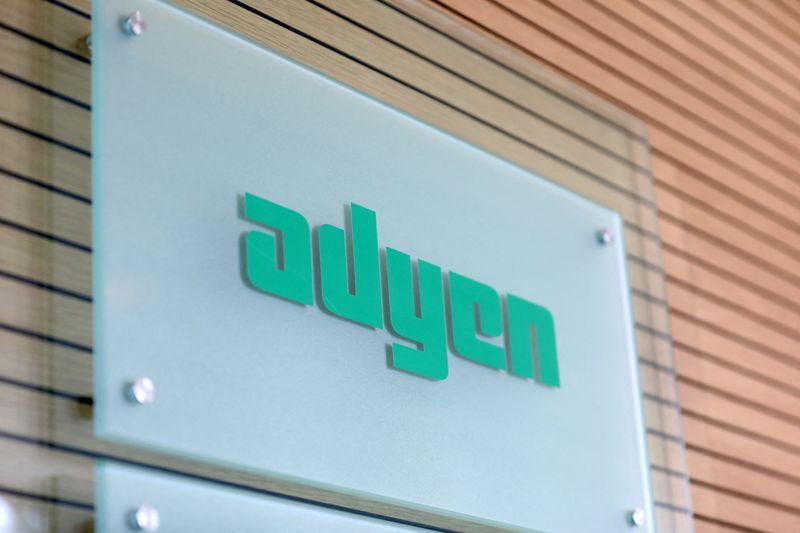By Toby Sterling and Elizabeth Howcroft
AMSTERDAM (Reuters) -Dutch payments processor Adyen NV's shares fell by a third on Thursday, wiping more than 13 billion euros off its market value, after first-half earnings missed estimates, as sales growth slowed and hiring costs hit margins.
Analysts said the company's performance raised concerns about stretched valuations in the digital payments sector and added to worries about a general slowdown in what has been viewed as a high-growth business.
Adyen, which provides services to the likes of Netflix (NASDAQ:NFLX), Meta, Microsoft (NASDAQ:MSFT) and Spotify (NYSE:SPOT), said revenue growth was slower in North America and that its margins were impacted by hiring costs.
CEO Pieter van der Does acknowledged that competitors in the U.S., which is Adyen's second-largest market after its European base, had won business by lowering prices. But he said it did not make sense for Adyen to engage in a price war with them.
"If there is any place that you could say is most prone to price competition it would be the U.S. because you can switch more easily," he said.
He said Adyen had not lost any of its large platform customers and the competition was an "isolated phenomenon" for one kind of customer: merchants that process both online and in-store payments.
Adyen's rivals in the US include Stripe, Braintree, Fiserv (NYSE:FI) and PayPal (NASDAQ:PYPL).
The company's shares fell sharply after a delayed start on Euronext due to volatility and were down 35% at 951 euros at 1233 GMT. At current prices, the shares are down more than 20% in the year to date, surrendering gains up to Wednesday's close.
"These are disappointing results, particularly the sales miss, and the key question will be whether the company can quickly revert to mid-term trend growth," JPMorgan (NYSE:JPM) analysts said.
Earnings before interest, tax, depreciation and amortisation (EBITDA) were 320 million euros ($348 million), down 10% from a year earlier and below analyst forecasts of 386 million euros, Refinitiv data showed.
Revenue rose 21% to 739 million euros, against Adyen's mid-term forecasts of more than 25% growth.
"In some areas the business grew at a lower rate than anticipated," the company said.
Jefferies analyst Hannes Leitner said some concerns are focused on Adyen, which is still more profitable and more highly valued than peers, and some on the sector and economy.
He said the economy overall is slowing and online payments growth may not be quite as fast as it was in the pre-COVID era. "This is impacting Adyen a little more than others."
Adyen's EBITDA margin fell to 43% from 59%, which the company said was mostly because of higher wage costs as it takes on more staff. The company hired 550 full time employees as part of an accelerated hiring push, a 17% increase.
A similar margin decline led to a sell-off in Adyen shares when the company reported full-year earnings in February.
Adyen CFO Ethan Tandowsky told analysts hiring would remain at similar levels in the second half of 2023 before slowing.

He said the company is maintaining its medium-term targets for revenue growth above 25% and an improving EBITDA margin that it expects to reach 65% in the long term. But he said it would take time for margins to expand toward that target after the current hiring push had slowed.
($1 = 0.9177 euros)